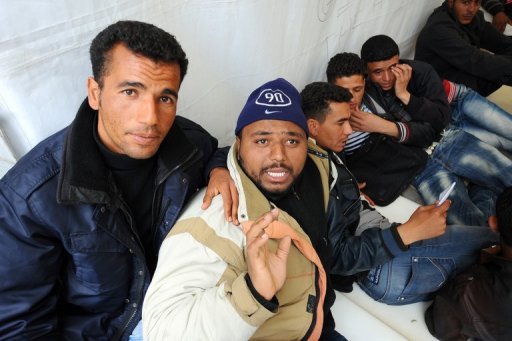
Southwest Tunisia has some of the world's richest phosphate deposits, but a recent series of violent protests by jobless residents highlights the region's desperate unemployment problem.
Applying for a job at the Gafsa Phosphates Company (CPG), long the area's main employer, has become so fraught with economic angst that police sent reinforcements for the company's latest hiring round, after the last sparked three days of violence.
Some 28,000 unemployed residents had applied for the 4,000 openings advertised by CPG and its parent company, the Tunisian Chemical Group (GCT).
When the companies released the list of successful applicants for the town of Om Larayes last Saturday, it exploded in protest as angry young residents set fire to a police station and threw stones at police, drawing teargas grenades in return.
The protests, which erupted Sunday, lasted until Wednesday. Calm has now returned, but the dejection remains.
"They've killed me," said Mohamed Issaoui, an unsuccessful applicant and father of two. "I'm already past 45, I'm invisible, I'm buried."
Om Larayes, a town of 35,000 that sits 60 km from the Algerian border, got just 605 job offers out of 3,000 applications to CPG.
The town was one of two that erupted into similar violence after an earlier hiring round in November that was later annulled because of the protests.
"CPG does billions in business," said Mohamed Naceri, who spent years looking for a better life in Europe before coming back to Tunisia. "They could give a billion and hire all the unemployed people in the south and they would still have money left."
Tunisia's southwest mining basin has been the scene of unemployment protests since 2008, a precursor to the uprising that ousted former president Zine el Abidine Ben Ali and sparked the Arab Spring.
The region's unemployment rate sometimes crosses 50 percent, well above the national rate of 18.3 percent posted last year.
Tunisia is the world's number five exporter of phosphates, mined for use in agriculture and industry.
And CPG is considered one of the country's best employers, with salaries far higher than the 280-dinar (140-euro, $180) monthly minimum wage, health insurance for the whole family, free transportation and bonuses.
But in Om Larayes, the phosphate washing plant has ground to a halt, with production and shipping suspended.
"For a year now the company has been paying us to do nothing," said Abdelhay Saoud, a middle manager who shows up every day to guard the facility.
CPG's directors fled the town during the violence, as protesters set fire to the company's administrative buildings.
Files were scattered on the ground, walls smashed in and windows broken as angry residents attacked the company that is seen as both the region's lifeblood and its enemy.
The lucky few who have just been hired by the company do not know when they will start work, or for what salary.
"The situation is catastrophic," said CPG engineer Ammar Seidi. "There needs to be investment in other industries, there needs to be infrastructure."
But other firms are closing one after another, driven away by strikes and social strife.
This week, Om Larayes residents learned the brand new buildings at Japanese auto parts manufacturer Yazaki, closed since the revolution, would not re-open their doors.
The firm is relocating to the larger city of Gafsa, taking 450 jobs with it.


